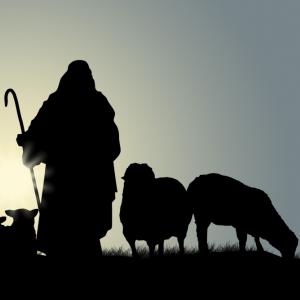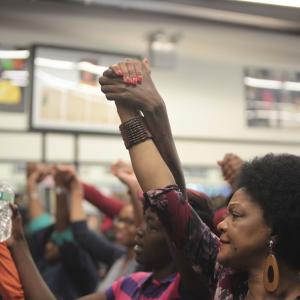The Rev. Jacqueline J. Lewis, Ph.D. is the Senior Minister at Middle Collegiate Church and Executive Director of The Middle Project, a leadership training institute for people of faith.
Posts By This Author
A Journey Toward Radical Welcome
I had the sense, as a child, that God’s goodness and mercy would only follow me all of the days of my life if I was “good” and Christian. And I had the sense that good and Christian was a narrow way.
This meant two things. First, only “good” people, loving and kind people, people who had not erred or strayed or made mistakes or broken the law or never “back-slid” were the sheep worthy of grace and mercy. Second, only Christian people were in the fold. Not Jews, Muslims, Buddhists, Sikhs — no, the steadfastly loving God had only space for those of us who accepted Jesus and our Lord and Savior AND who had lived sinless lives.
My child-like sense of “good” shifted when I was a teen serving as an elder in the Seventh Presbyterian Church in Chicago. Being up close and personal with my pastor, the late Rev. Oliver Brown, III and the adults around the table were first- hand lessons of the wide-open space of God’s love in Jesus Christ.
These good people — ordained people — were flawed and funny. They fussed and fought. They forgave each other, as God forgave them. My idea of good stretched and breathed and exhaled judgment and inhaled, experientially, that only God is good, that God in Jesus Christ shows this goodness in a particular way, and that all of God’s people are flawed and loved.
As a young adult before seminary, living life in the world, working, loving, breaking up, making up, having growing pains about identity and purpose and vocation, my spiritual muscles strengthened around the concept of the good shepherd who would love me enough to come and get me if I wandered.
Jesus is the ideal shepherd, the model shepherd, the best kind of shepherd; the one who makes the promises of God available to all of God’s people by laying down his life for the sheep.
I had not yet made the leap but most certainly have now to John 10:16.
I have other sheep that do not belong to this fold. I must bring them also, and they will listen to my voice. So there will be one flock, one shepherd.
This loving Shepherd has a huge and diverse flock.
Release. Repair. Restore: Thoughts Beyond Ferguson Toward Racial Healing
We must engage in courageous conversations. We need to have them in and amongst our own people—our families and our children, our close friends and allies, and in our racial/ethnic groups. A caucus can be an important thing. Make space for the asking of deep questions and the sharing of even awkward sentiments. Why is this happening? What does it mean? How does it affect my soul? Aren’t we past race yet, and can I do anything about this? How does my faith in God relate to these issues? How can I be a healer?
And we must have these conversations across what might seem to be natural divides. We need to have cross-racial/cross ethnic conversations. In order to do this, we must have relationships. We can’t liberate each other while we are in silos. Multiracial/multiethnic congregations like Middle Collegiate Church are critical to the work of racial reconciliation. If your church is diverse, think of ways to encourage deeper relationships. In our context, we have an ongoing small group called Erasing Racism, in which we are having critical conversations about race. If your context is mono-cultural, find a partner with whom to relate. Create a joint worship celebration or prayer vigil during Advent and have conversation as you break bread. Use questions like: When was the first time I was othered due to my personhood? When have I othered someone else? How can these experiences plant seeds for empathy? How did I learn the story of race and what can I do to change it?

